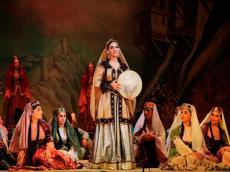|
|
TODAY.AZ / Arts & Entertainment
Natavan opera shown at Opera & Ballet Theater
05 October 2022 [10:21] - TODAY.AZ

By Azernews
By Laman Ismayilova
The Azerbaijan State Opera and Ballet Theater has presented an opera "Natavan" by a prominent composer, People's Artist Vasif Adigozalov, Azernews reports.
This year marks the 190th anniversary of Xurshidbanu Natavan, great poetess and the daughter of Mehdi Gulu khan, the last ruler of the Karabakh khanate.
The opera tells about the life path of a great poetess. The author of the libretto is Nazim Ibrahimov, and the verses are written by Ruzgyar Afandiyeva. At the same time, poems by Khurshidbanu Natavan, Qasimbay Zakir and other members of the Majlisi-Uns literary society were used in the libretto.
The opera production was warmly accepted and received thunderous applause from the audience.
The main roles in the opera were performed by People's Artist Azar Zeynalov, Honored Artists Jahangir Gurbanov, Tural Aghasiyev, Tayyar Bayramov as well as leading soloists Seljan Nasibli, Taleh Yahyayev Mahir Taghizada, Atash Garayev, Fahmin Ahmadli, Ravan Amiraslanli, and many others.
The opera "Natavan" was staged and directed by People's Artist of Azerbaijan and Uzbekistan Firudin Safarov, the director of the performance is Honored Art Worker of Azerbaijan Hafiz Guliyev, the production designer - People's Artist Rafiz Ismayilov, choreographer-People's Artist Tamilla Shiraliyeva,choirmaster-Honored Art Worker Sevil Hajiyeva, music director and conductor - People's Artist Yalchin Adigozalov.
Khurshidbanu Natavan became popular through her relationship-themed ghazals and rubaiyat. Kindness, friendship, humanism, and love were the main themes of Natavan's ghazals.
Her romantic poems express the feelings and sufferings of a woman who was not happy in her family life and who lost her son. She adopted the pen name Natavan, a Persian term meaning "powerless", after her son’s tragic death in 1885.
Some of her known poems are "To My Son, Abbas", "Lilac", and "Beloved One", which are still used in folk songs.
In addition to poetry, Natavan was also engaged in painting. She was exceptionally good at pencil sketching and attractive embroidery as well. Her landscape sketches were the first-of-a-kind in European style in Azerbaijani art, which perfectly combined the concepts of the Western and Oriental art forms. Her embroidery works were regarded as masterpieces.
After her father's death, she was closely engaged in philanthropy, promoting the social and cultural development of Karabakh.
Even though she took over the Karabakh khanate at the young age of 13, Natavan successfully established her literary career and managed the responsibilities of developing her native city, Shusha.
She did a lot for the welfare of people, including building a water pipeline, opening schools, and building hospitals.
Prominent for her charity and social activity, Natavan was the first to provide her home city Shusha with drinking water.
Among her deeds was a water pipeline that was first laid down in Shusha in 1883, thus solving the water problem of the townsfolk.
Moreover, she also did a lot for the development and popularization of the famous breed of Karabakh horses. Karabakh horses from Natavan's stud were known as the best in Azerbaijan. In an international show in Paris in 1867, a Karabakh horse Khan from Natavan's stud received a silver medal.
The daughter of the khan was also active in sponsoring one of the first literary societies. She established the first literary society in Shusha and went on to sponsor several more across the country. Majlis-I Uns (Society of Friends) became a renowned poetic circle in Karabakh.
URL: http://www.today.az/news/entertainment/226406.html
 Print version
Print version
Connect with us. Get latest news and updates.
See Also
- 07 March 2025 [20:30]
Children's Philharmonic to present Novruz holiday concert - 07 March 2025 [14:56]
Fikrat Amirov's opera presented in Baku - 07 March 2025 [13:29]
Heydar Aliyev Center to host event on theme "Creative Azerbaijan" - 07 March 2025 [12:03]
Cadenza Contemporary Orchestra captivates music lovers - 07 March 2025 [10:41]
Heydar Aliyev Center showcases art pieces by Italian sculptor - 06 March 2025 [14:18]
Culture Ministry launches new project on cultural journalism - 06 March 2025 [12:05]
First Fikrat Amirov Republican Music Festival opens its doors to music lovers - 06 March 2025 [10:42]
Ganja hols concert within Fikrat Amirov Republican Music Festival - 05 March 2025 [12:57]
First Fikrat Amirov Republican Music Festival kicks off - 05 March 2025 [11:34]
Culture Ministry awards Trend News Agency correspondent
Most Popular
 Philippines and Canada prepare to sign agreement on deployment of troops
Philippines and Canada prepare to sign agreement on deployment of troops
 Very "scary" Macron and his very red button
Very "scary" Macron and his very red button
 Azerbaijan reaffirms commitment to climate action ahead of COP30
Azerbaijan reaffirms commitment to climate action ahead of COP30
 Kabul blast plotter confesses to involvement in Crocus attack — US Justice Department
Kabul blast plotter confesses to involvement in Crocus attack — US Justice Department
 Azerbaijan Discusses Energy Cooperation at EU-Slovakia Working Group Meeting
Azerbaijan Discusses Energy Cooperation at EU-Slovakia Working Group Meeting
 Saudi Arabia submits Expo 2030 registration dossier
Saudi Arabia submits Expo 2030 registration dossier
 Trump allows extension of delay in blocking Tik Tok in United States
Trump allows extension of delay in blocking Tik Tok in United States
